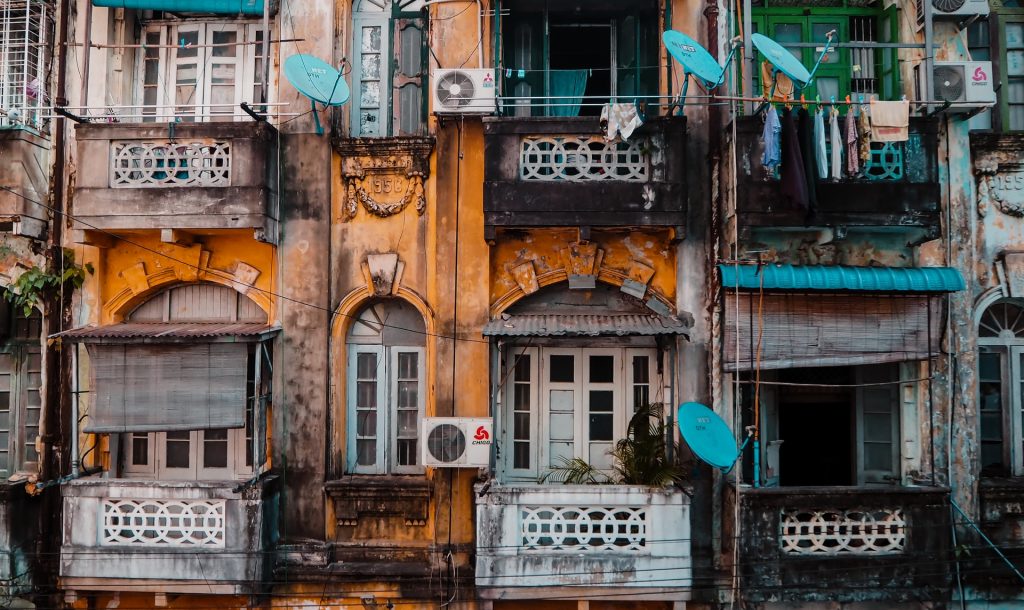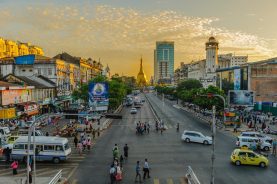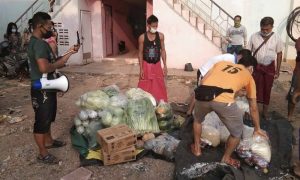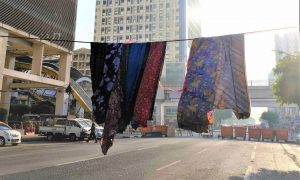New Mandala is publishing a series of interviews with academics who contributed to the 2021 ANU Myanmar Update. This week we caught up with Sara Tödt, a PhD candidate at the School of Management at RMIT University. We discussed Sara’s international business background and how that led to an interest in the changing role of female workers in Myanmar’s garment production industry. Originally from Sweden, Sara is fascinated with connecting with people to understand how female garment workers are navigating this time of crisis in Myanmar.
Andre Kwok: Sara, can you tell me a bit about how you became interested in Myanmar and Southeast Asia more broadly?
Sara Tödt: I was in the process of planning what to write my master’s thesis at Copenhagen Business School on, and I had just finished a course on business and human rights. Me and my thesis partner decided to focus on the garment industry because it is something that you wear, it is on your body, it’s something personal to a lot of people and it is a product we could understand. In terms of why we chose Myanmar, we wanted to contextualise the topic of labour and human rights, and found that whilst there was relatively plenty of research on countries like Bangladesh, India and Sri Lanka, there was not as much written about Myanmar. We also found it to be a particularly interesting research context for exploring the dynamics of the garment industry, as then (in 2017) the US had just the year before removed their sanctions.
Myanmar had been under sanctions by the EU and US, which particularly impacted the country’s garment industry as the majority of the exports from Myanmar to the US were from that sector. We found this very interesting in terms of understanding how this re-embedding of Myanmar’s garment industry into the global market would impact on labour and human rights issues. During the sanctions the Myanmar garment industry had to adapt to export regionally around Southeast Asia, but with the sanctions removed, fashion brands like H&M were starting to place orders in the country. My thesis partner and I sent out a bunch of emails asking people who worked in the labour relations space if they would meet with us and to our surprise, being nervous master students, people were so helpful and accommodating. So, we booked out flights to Yangon and started doing interviews.
Andre Kwok: Could you share some of your experiences of doing research in Myanmar, especially during Covid-19 and the coup?
Sara Tödt: Most of my experience doing research in Myanmar has involved working with research partners in Myanmar who have well-established connections with garment workers and labour unions. During my master thesis research in Myanmar I felt like I was a mix of a backpacker and researcher, not really knowing what I was doing and travelling around interviewing anyone I came across. I was originally nervous entering a new country and meeting new people, but I was fortunate to have experienced a welcoming energy from people, who were also very interested in my research. I was really fortunate that people I interviewed were very generous with sharing their knowledge and networks with me, giving me direction on how to navigate both the Yangon traffic and the complex labour relations landscape. Interviewing people in the garment industry and labour relations space gave me a small insight into the unique lives of women garment workers in Myanmar, which led to both personal growth for me and meaningful research insights. This drove me to eventually pursue a PhD and focus on studying women garment workers’ everyday lives and decisions around life and work.
For my PhD research I worked closely with Aung Myin Hmu, an organisation that before the military coup ran a training centre for garment workers, providing sewing machine training and working to improve the quality and safety of employment for urban migrant women. It was a bit of a miracle that we managed to set up a research collaboration with AMH. COVID-19 travel restrictions had just overthrown my plans to go back to Myanmar and conduct interviews with women garment workers myself. It was actually made possible by reconnecting with a contact I made when in Myanmar for my masters research, Suzanne Tym, who at the time was the program manager for AMH. By setting up a collaborative online research team we managed to conduct interviews with women garment workers during this time of crisis and change, and I am so grateful for the hard work of Suzanne, Kaung and their team.
Andre Kwok: I noticed that you come from background in business and public relations. How has this shaped your Myanmar research?
I entered the research space after working in public relations and communications for a couple of years after graduating from my master’s degree. It was a fun few years where I had the opportunity to work with some of Sweden’s largest companies in a range of different industries to help them communicate around social and environmental sustainability. However, working at this quite surface level of issues around how big business impact on people and the world we live in, I kept coming back to the meetings and interviews with workers in Myanmar, who really lived with these impacts in their everyday life.
I really enjoyed working in PR, it was fast-paced, relationship and network-driven and involved translating often quite complex and intricate decisions and processes in to clear, sharp messages. I try to bring aspects of this into my PhD and my research, however with varying results in terms of the “fast-paced” aspect. The networking and relationship-building aspects have been important skills to draw on in setting up a field research project from a distance during these times of COVID-19 restrictions. In many ways I think my research has benefitted from collaborating with a team of Myanmar researchers rather than me going to Myanmar and doing interviews myself. Being able to connect with and learn from the team at AMH has been so important, especially when the coup took place and the difficulties with getting information from the ground about what is happening in the country and how people are navigating this crisis.
In the research space, I often feel a bit like the outsider. In the business research environment I often feel like I ask questions a bit “from the sideline” when I bring my passion for feminist research approaches and worker-centred points of view in global business. At the same time, in the human rights and sociology space I sometimes feel like the classic businessperson, blabbing on about global production networks and the dynamics of power and value capture. However, I have grown to appreciate my background of mixed experiences because of the range interconnected perspectives I can bring to bring to my research, and to highlight connections to topics that previously appeared separate. It is also very fascinating and a privilege to be able to work with fantastic researchers across these different disciplines and research spaces, learning from their expertise and overview of the field.
In blending these disciplinary perspectives grounded in business and the social sciences, I am interested in the interconnected relationships between global business and local contexts, from a gender perspective. I want to understand how work in global production “fit” within workers lives, and how in turn workers’ lives fit within structures of global production. As I look at an industry where the majority of workers are women, I look at how gender relations shape this relationship between global garment production networks and women garment workers. I explore women’s stories of everyday decisions and choices around responsibilities at home, such as taking care of children, caring for family members, and responsibilities at work, such as meeting production targets and working overtime. In Myanmar this has obviously been impacted by first COVID-19 and then the military coup, with women garment workers and their families having to make choices for their survival. I believe their stories are immensely important in terms of both understanding the many different dimensions of what people in Myanmar are living though now, but also to inform the discussion around what fashion brands response to the coup should be.
Andre Kwok: It is very thought-provoking to see how you bring these interdisciplinary perspectives to light. What did applying a gendered lens look like while working with female garment workers in Myanmar?
Sara Tödt: Great question. The clothes we wear are made by women, and that is a very intentional characteristic of the fashion industry. There is a lot of research on this, on the feminisation of garment production and how that underpins undervaluation of women’s work and enables fashion brands to keep costs down. Adopting a gendered lens is a central focus of my research, observing how gender relations in Myanmar influence women’s decisions to start working in the garment industry but also how gendered structures in production impact on women’s lives. I take a feminist approach to research, which means that I see great value in capturing women’s stories in a rich and encompassing way, seeking to understand their shared motivations and challenges in their everyday lives as garment workers. In my research this has meant doing so-called semi-structured interviews, where the interview questions are a guide rather than a detailed script and we allow the women to steer the conversation around topics that have meaning to them. It also entails asking women garment workers questions about life adjustments when they have children, get married and take time of work to care for their parents as well as their motivations to work and aspirations for the future.
In terms of my research, the gendered lens illuminates many important observations that reflect the multi-faceted spheres of worker life in Myanmar.
Now that we have completed the last round of interviews, an observation that I would like to highlight is the importance of the dynamic role of women in family structures and as significant income providers. Women often view themselves as responsible for carrying the economic burden to provide for their families, which motivates them to move from rural villages to the cities for better economic opportunities. For young women this might be the first time they leave their home village and social connections with other workers and friends from home are important. As these women live and work in cities like Yangon, many of them send a portion of the money they make back home to their families. Many of the women we’ve talked to have ambitions dreams that go beyond the being labourers in the garment industry. Many women dream of providing a future for their families and owning little shops alongside starting their own businesses, some dream about selling their own clothes. This echoes the aspect of women seeing themselves primary income providers and the importance of women being agile and having the ability to establish social connections as they respond to changing socio-economic environments. I also found it fascinating how this illustrates how women are to certain degrees adopting conventionally “masculine” responsibilities, highlighting the complexities of gendered economics generated by urban migration in response to work opportunities in global production.
"I saw for the first time that Buddhist philosophy was connected to daily struggles and politics at a very fundamental level."
Profile: Hunter Marston on shifting from Buddhist philosophy to politics in Myanmar
Andre Kwok: Final question. What would be your advice to people and students interested in Myanmar today?
I think two things. I think one is general advice to anyone keen on doing PhD or further research is that while I think it is great to have a broader plan of what the issues are that you want to explore, it is also equally important to dip your toes in the field before formulating too many sharp questions. This is especially pertinent in places like Myanmar, a place undergoing rapid change with many competing understandings of the country. Considering this, I think there is a real value in learning from insider perspectives through authentically listening to the people in Myanmar who are experiencing the bewildering political regime first-hand. This is significant because only observing the country from the outside will often lead to incomplete understandings of the complex realities of present-day Myanmar. The challenge in the current situation is to bring as many insider perspectives out of Myanmar as possible, whilst acknowledging that we as researchers are very much on the outside of what people in Myanmar are living through.
Moreover, I also think it’s important to be sensitive of the various struggles and remain conscious of ethical conduct when conversing with people. When trying to form genuine relations with people in Myanmar, I think it is so important to try to be an effective listener and not be a person that goes around demanding information. Instead, we should be concerned about connecting with people who provide us with the privilege of hearing their stories, often about sensitive memories stemming from unexpected impacts of political suppression on their lives and futures. We should not discredit the value of stories of everyday life and struggles.
The second piece of advice is framing interview accounts and formulating research questions in context. In Myanmar, this is challenges because of the closed-off nature of the country and the little data on the country. Although we know some things, there are still significant gaps in reaching a full picture understands on several topics. To remedy this, I want to find ways to continue to explore what’s happening in Myanmar through creative online mediums. Since we won’t be able to travel to Myanmar in the foreseeable future, innovation and online solutions will become increasingly important in forming collaborative methodologies to conduct research across Myanmar and Australia.
Andre Kwok: Thank you for sharing your story that covers much ground. I have learnt a lot from our discussion today and I wish you the best of luck with your future work.
 Facebook
Facebook  Twitter
Twitter  Soundcloud
Soundcloud  Youtube
Youtube  Rss
Rss 



